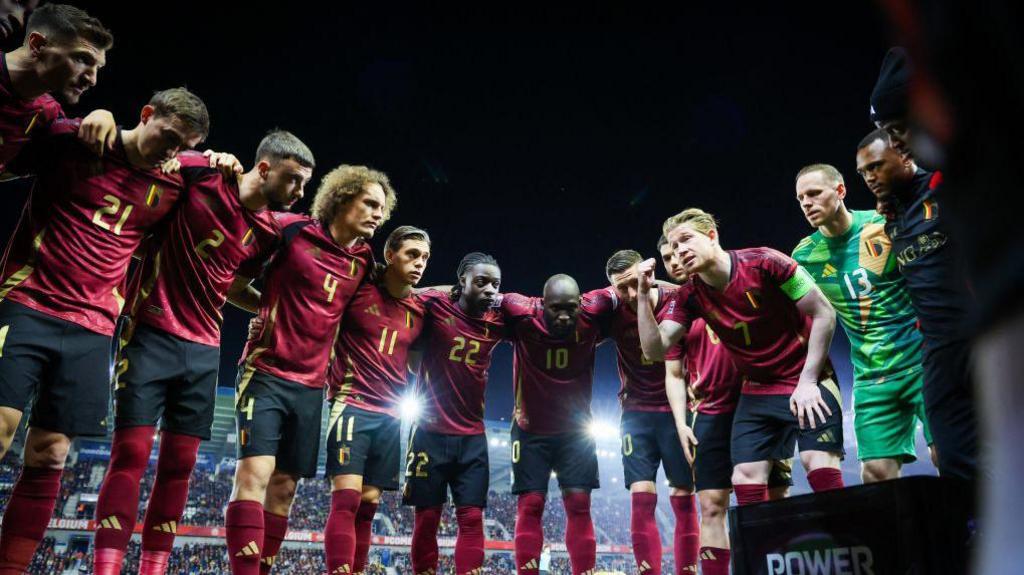 Image source, Getty Images
Image source, Getty Images
Belgium have only won once in their last eight games - but have a new manager and a new generation of players
Chris Wathan
BBC Sport Wales
World Cup qualifier: Belgium v Wales
Venue: King Baudouin Stadium, Brussels Date: Monday, 9 June Kick-off: 19:45 BST
Coverage: Live on BBC One, S4C, BBC iPlayer, BBC Radio Wales and Radio Cymru, the BBC Sport website and app, plus live text commentary.
They were once the world's number one side.
But the questions now keep coming for Belgium, a nation who have slowly said goodbye to a golden generation that dazzled but never truly delivered.
Dropping points to North Macedonia on Friday night was their latest difficult evening, a late goal in Skopje denying Rudi Garcia victory in his first World Cup qualifying game since taking charge with the aim of arresting a slide that has brought just one win in their last eight games.
Kevin De Bruyne was described by one Belgian newspaper to have flapped his arms in frustration several times before being substituted ahead of Monday's crucial game with Wales.
Only he, the injured Thibaut Courtois, and Romelu Lukaku remain of their incredible clutch of players that were ranked as the international game's best for the best part of a decade.
And yet there is also excitement around a new generation of talent that could yet keep Belgium an international threat.
So what exactly happened to Belgium? And as Craig Bellamy's resurgent Wales prepare to head to Brussels, where are they now?
A youth revolution
 Image source, Getty Images
Image source, Getty Images
Eden Hazard, Jan Vertonghen, Dries Mertens and Vincent Kompany celebrate a milestone win over Wales in 2012. The side had an average age of 24 and would end a 12-year tournament exile
As Belgium exited Euro 2024 with a whimper, barely making a mark on the tournament, De Bruyne made his feelings clear on the "stupid" question he had received.
"And you say that France and England and Spain and Germany [didn't have] a golden generation?" he asked, biting back at a question about his country's version had failed to live up to expectation.
Maybe so.
But it is hard not to recall missed opportunities of a star-studded side.
The biggest was arguably at the hands of Euro 2016 darlings Wales. There is an irony that some see Cardiff as the beginning of the team's journey to the top.
Belgium had failed to qualify for five consecutive major finals and when they arrived in south Wales to take on Chris Coleman's side in September 2012, they had been outside the world's top 50 just a few weeks earlier.
But the Belgian's FA response to a decade-long absence from the biggest stage was to invest into youth development, a decision that was about to deliver its dividends with Marc Wilmots side teeming with talent playing at elite clubs across the continent.
They weren't yet household names. Courtois (20) and De Bruyne (21) won their fourth caps that night while the likes of Eden Hazard (21), Lukaku (19) combined with – goalscorers in the 2-0 win - Jan Vertonghen and Vincent Kompany relative veterans at 25 and 26 respectively.
With Axel Witsel, Toby Alderweireld, Moussa Dembele, Dries Mertens and more to call upon, Belgium went unbeaten through the campaign and qualified for the 2014 World Cup – and for every major finals since.
By 2015 they were first in Fifa's rankings. When they returned there under Roberto Martinez in 2018, they stayed top of the world for four years.
Better than Brazil
And yet they remain the only nation to have held that spot without ever winning a major trophy.
"Overall, this generation definitely had what it took to achieve the big goal of winning a title," says Jean-Marie Pfaff, the cult hero goalkeeper who was part of the side that reached the 1980 European Championships final and the 1986 World Cup semi-finals.
"Unfortunately, this didn't work out because the players rarely played as a real team, with one player running for another. The burden was on a few individual shoulders, which was not enough."
Belgium were brilliant at the 2018 World Cup - beating Brazil in the quarter-finals - only to come up agonisingly short in the semi-finals against would-be champions France.
But, for all the hype and hope, that was as good as it got. Like 2016, Euro 2020 ended in the quarter-finals. The 2022 World Cup saw them slump out at the group stages amid retirements, the resignation of Roberto Martinez and talk of rifts among the squad.
Former midfielder Radja Nainggolan was reported as admitting they were a team of too many individuals trying to stand out.
It continued under Martinez's replacement, the young former Leipzig coach Domenico Tedesco. Soon enough Courtois had placed himself in self-imposed exile citing a lack of confidence in the new manager.
"The side actually had a very good qualification campaign for Euro 2024," says Bart Lagae, journalist with Belgian newspaper De Standaard.
"It surprised people because with Hazard and others gone, they thought the golden generation was already over.
"But there was a new manager with a new system, new players like Jeremy Doku who thrived on the counter attack."
But after an unbeaten road to Germany, the tournament ended with last-16 defeat to France. They had only scraped through to the knock-outs after a draw with Ukraine that saw fans turn on the side in Stuttgart.
"Things didn't progress," adds Pfaff. "Performances stagnated, there was no sign of development and the results weren't right.
"Key players were too often missing through injury, and there were repeated internal differences, which did not help matters and were a constant disruptive factor."
Wales secure first competitive win against Belgium in 1990
'Something big could happen again'
On the back of veiled criticism from De Bruyne, Tedesco left in January with former Lyon, Marseille and Roma coach Rudi Garcia coming in for the Nations League play-off with Ukraine, overturning a 3-1 first leg deficit to remain in the top-tier.
"The thinking was he is a manager who has won things, and a lot of the talk has been that is more about mentality, about handling the pressure," adds Lagae, who says some hope has returned.
And for good reason. Courtois has returned while Lukaku is fresh from a Serie A title with Napoli, while De Bruyne remains despite suggestions the 33-year-old would be next to retire.
"If he is motivated he is still able to decide games," says Lagae.
But as well as the recognised names – Youri Tielemans, Leandro Trossard and Matz Sels are among the Premier League contingent - there is also the new breed that excite.
"I think the interesting thing about the 2018 World Cup generation was that they didn't arrive in 2018 - they went through periods of learning and succeeding and some difficult moments first," says Luke Benstead, an analyst with the Belgium team under Martinez and Tedesco.
"And that's also the generation now with the likes of Amadou Onana coming through, Zeno Debast, Jeremy Doku. The talent is huge.
"But it takes tournaments to arrive as a generation; these players in Belgium have had such an experience in football from a young age, it will take one tournament for them to arrive and with their quality, there's no reason they can't do it."
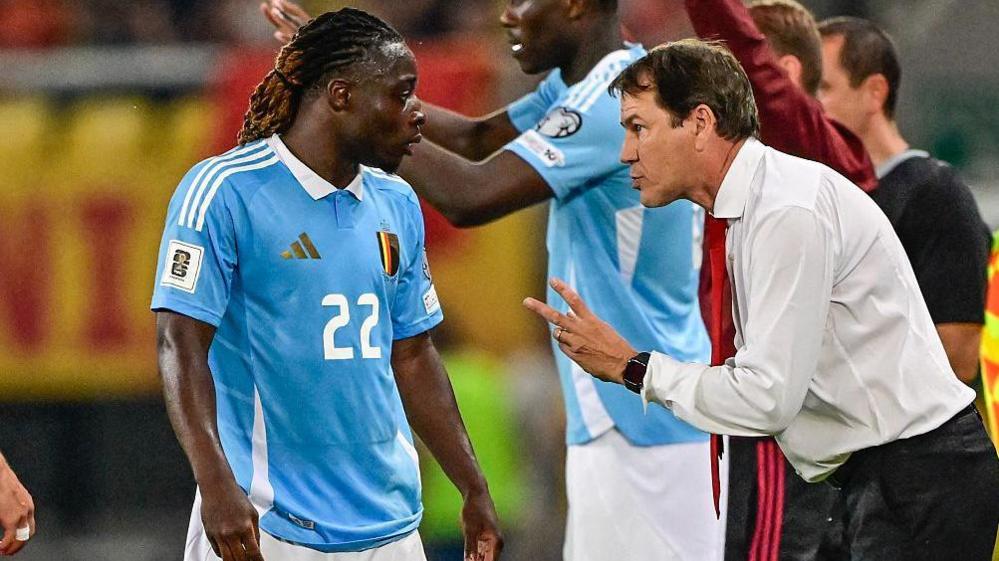 Image source, Getty Images
Image source, Getty Images
Manchester City's Jeremy Doku couldn't help Rudi Garcia earn a win in his opening World Cup qualifying game in charge of Belgium as they drew 1-1 in North Macedonia
The thinking appears justified.
As well as Sporting's 21-year-old talent Debast, there is excitement about Ajax teenager Jorthy Mokio. The 20-year-old former Chelsea full-back Diego Moreira has been called up after an impressive year at Strasbourg having switched allegiances from Portugal. Chelsea's Romeo Lavia was left out after only returning recently, but is another on which hopes are built.
And there are others who Garcia has turned to, such as wideman Alexis Saelemaekers who impressed at Roma on loan from AC Milan last year.
Some are known to a certain Craig Bellamy having seen the likes of Doku – who the Wales manager says could lose you in a phone box – and Zebast come through at Anderlecht during a two-year spell under Kompany with the Brussels giant's youth team.
"People should remember too that the golden generation worked a lot with these players," adds Benstead.
"You had Jan Vertonghen who only just retired last year, and many of them players like Rom, Kevin, they were inside that young generation passing on that knowledge. They opened the door a little bit to what was possible."
Fans are still wary of placing too much faith in Garcia, especially with the performance in Skopje being criticised defensively for a team that once could call on a company of top-level centre-backs.
And the visit of Wales will be perhaps their sternest test.
But while the golden generation may have gone, Belgium are not done.
"More would have been possible (with the golden generation), but Belgium will continue to have a team that can compete at the top in the future," insists Pfaff.
"The young players may have to learn the hard way over the next few months, but something big could happen again in Belgium."

 5 hours ago
1
5 hours ago
1
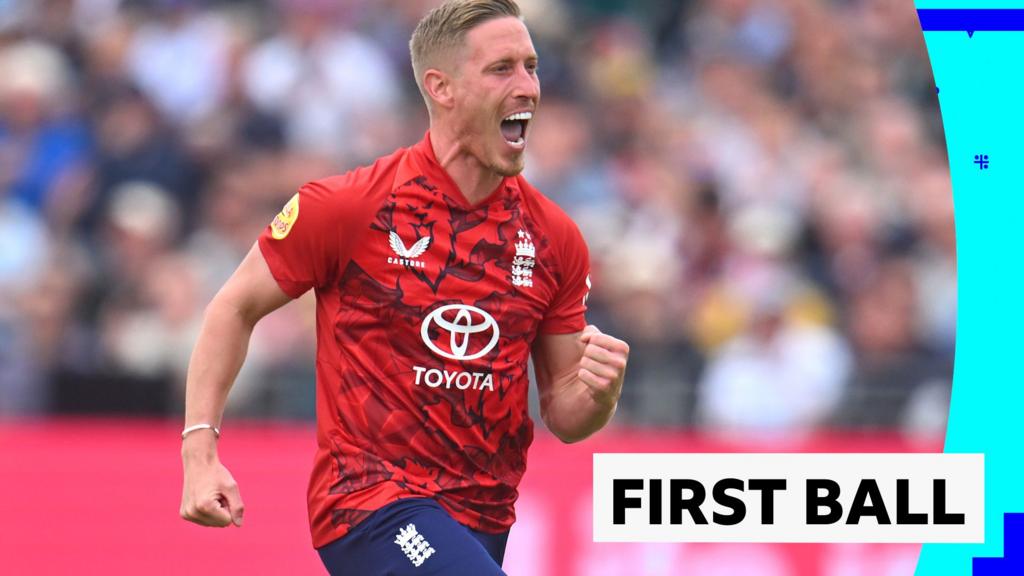
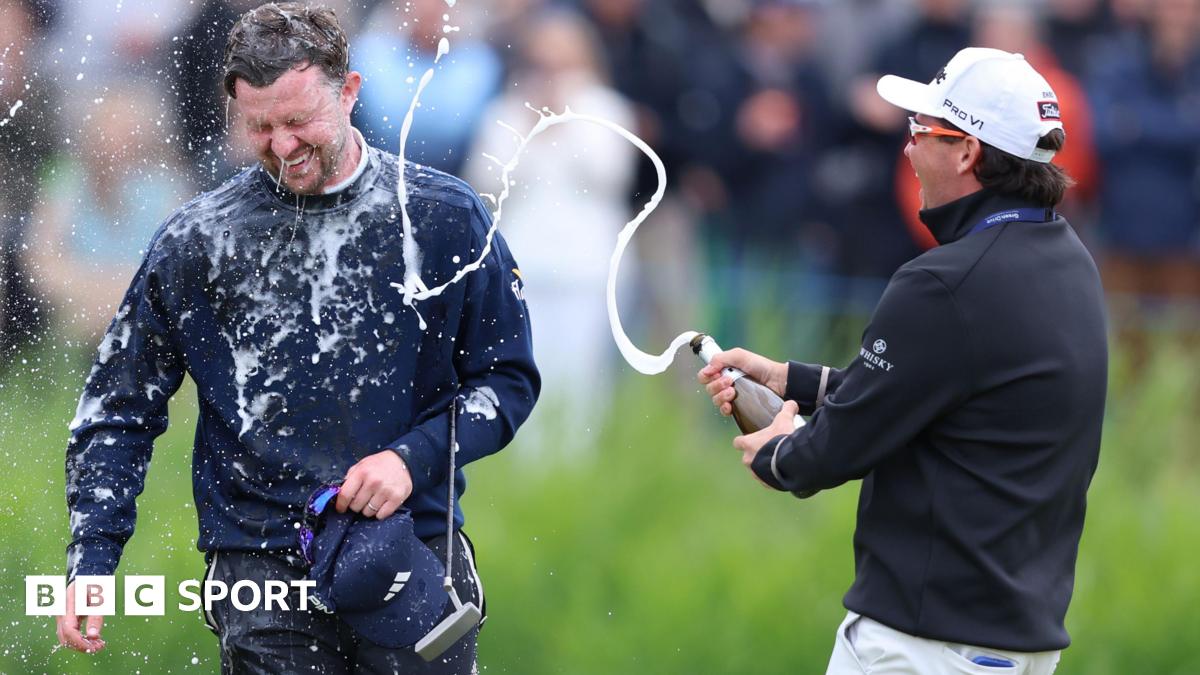
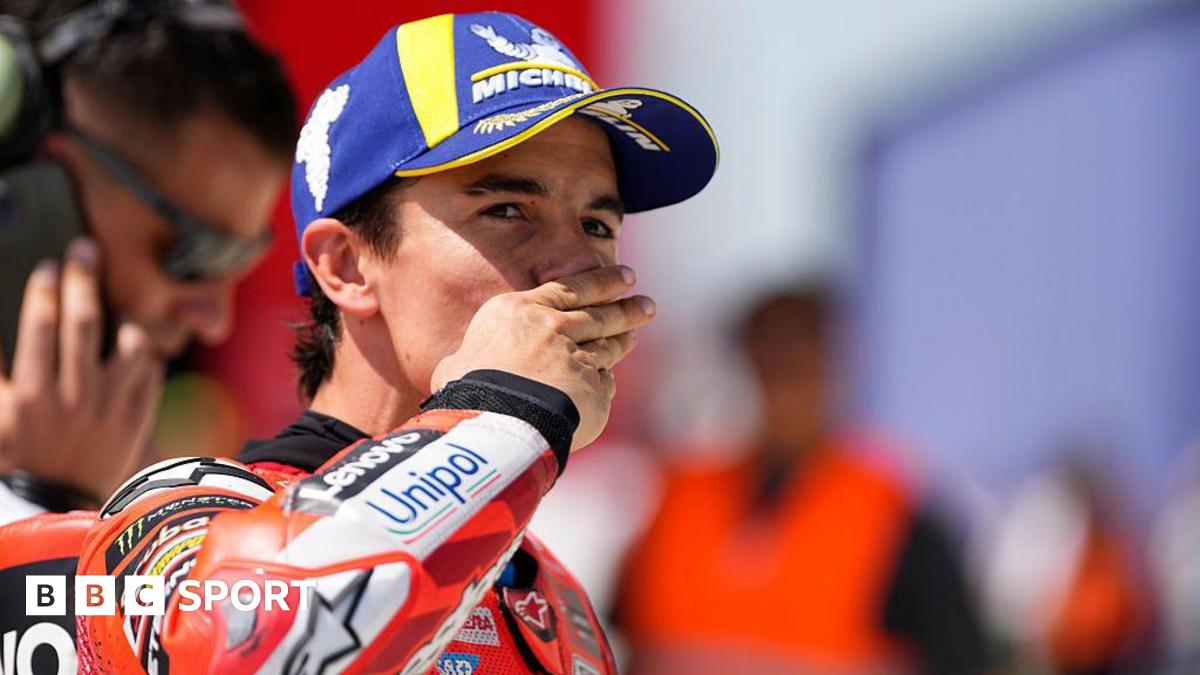



 English (US) ·
English (US) ·